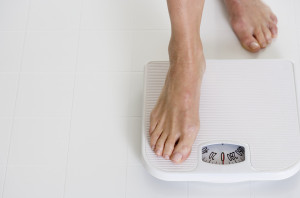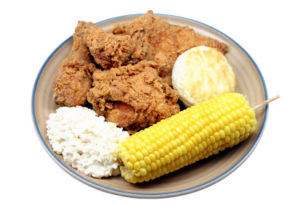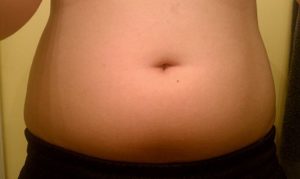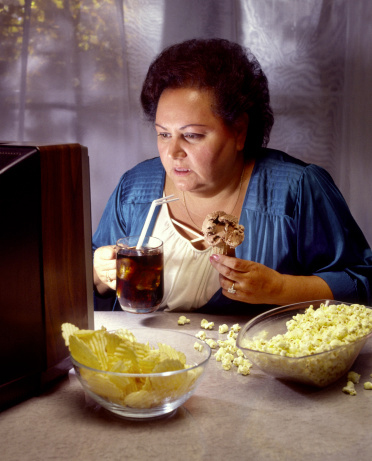 Marie, a nurse for ten years, has gone on yet another diet, and to date has lost over one hundred pounds. She looks in the mirror each morning with ambivalence. On the one hand, she admires her new body and feels proud that all her hard work has paid off. On the other hand, she has the uncomfortable feeling of having become fragile and frail, afraid that she could “break easily”.
Marie, a nurse for ten years, has gone on yet another diet, and to date has lost over one hundred pounds. She looks in the mirror each morning with ambivalence. On the one hand, she admires her new body and feels proud that all her hard work has paid off. On the other hand, she has the uncomfortable feeling of having become fragile and frail, afraid that she could “break easily”.
One particular morning Marie finds herself standing in front of the refrigerator eating ice cream out of the carton. She convinces herself that it’s okay to eat the ice cream this one time because she has a busy day at work. Ice cream soothes and calms her – she hates to feel anxious and tense on the job. This eating behavior continues every day for several months however and she gains back almost thirty pounds.
Marie thinks that her problem is lack of willpower. While she’s aware that she has a problem with food she believes this is her only problem. She hears an inner voice urging her to lose weight and be thin. At the same time the inner voice argues that she can’t stick to a diet long enough to take it off and keep it off.
Today, most women with eating problems are educated enough to know that food is not the problem, but rather the symptom of the real issue. Food can be seductive, satisfying, soothing, and tempting. It is often described by women as “better than a lover”; it’s always there for me, it doesn’t leave me, it nurtures me and fills my need and I can depend on it all the time.”
Another source of conflict is the association of weight with body image. Overweight women tend to view slim women as superficial, petty, fragile, selfish, and non-caring – all very negative characteristics. Yet, being slim is their goal. This conflict produces a flurry of feelings since being thin is alternatively seen as being positive and negative, virtually assuring failure. For women, body image and sexuality are inseparable.
In Marie’s case, her mother was overweight, sexually inhibited, had very low self-esteem, did not take care of herself and constantly fed Marie with negative images about men, “Don’t let them take advantage, you have to be strong and stand up to them or they will rule you!” she would say. Marie’s parents’ relationship reinforced these messages. There was never a sign of affection between them, but rather an on-going power struggle to “win”. As a result of watching her parents battle, Marie grew up believing that winning meant being big and strong: being overweight was seen as an advantage.
In my practice, I have seen a high percentage of overweight women who have been sexually abused. Compulsive eating frequently begins after sexual abuse occurs. The genuine tragedy is that such women spend thousands of dollars trying in vain to lose weight without an awareness of the connection between sexual trauma and their eating problem. Trying to diet without dealing with the underlying issues only treats the symptoms and not the cause, thereby assuring the dieter’s failure each time.
Women can free themselves of food obsessions, weight problems and a lifetime of yo-yo dieting. As a start, answers to the following questions can provide valuable insight:
1. When did my eating problem begin?
2. What was gong on in my life at the time I started to gain weight?
3. What messages did I get about my body and my sexuality while growing up?
4. What was my mother’s relationship to my father?
5. Did I receive any negative messages about my father or about my body?
6. Did I receive disapproval for being too feminine or for not being feminine enough?
These answers may help you begin recognizing the developmental patters of your overeating, how it began, and hot to begin to change it. This is, however, only the first step. Recognizing that you have a problem and accepting that there is help available to deal with these issues, will ultimately assist you to break free from destructive eating patterns and to have a “normal” relationship with food.
 Most overeaters feel that they lack will power and motivation in their attempts to lose weight. They must become aware that food has symbolic meanings, most often hidden from conscious awareness. Such understanding is an important element in helping the compulsive eater come to grips with the psychological difficulties in losing weight. Consider the following alternative meanings which obese persons, and others with eating disorders, have unconsciously assigned to food:
Most overeaters feel that they lack will power and motivation in their attempts to lose weight. They must become aware that food has symbolic meanings, most often hidden from conscious awareness. Such understanding is an important element in helping the compulsive eater come to grips with the psychological difficulties in losing weight. Consider the following alternative meanings which obese persons, and others with eating disorders, have unconsciously assigned to food:
 Many people who join Solutions claim that they know why they overeat. While knowing is the first step, you need to follow though and explore these reasons in a deeper way.
Many people who join Solutions claim that they know why they overeat. While knowing is the first step, you need to follow though and explore these reasons in a deeper way.
 Marie, a nurse for ten years, has gone on yet another diet, and to date has lost over one hundred pounds. She looks in the mirror each morning with ambivalence. On the one hand, she admires her new body and feels proud that all her hard work has paid off. On the other hand, she has the uncomfortable feeling of having become fragile and frail, afraid that she could “break easily”.
Marie, a nurse for ten years, has gone on yet another diet, and to date has lost over one hundred pounds. She looks in the mirror each morning with ambivalence. On the one hand, she admires her new body and feels proud that all her hard work has paid off. On the other hand, she has the uncomfortable feeling of having become fragile and frail, afraid that she could “break easily”. Why do you overeat?
Why do you overeat? Part of the reason why people are fat today is because of certain family “food rules.” We all know the parent whose child comes home after school and tells her she is hungry – and Mom says, “You can’t eat now. Wait until dinner or you’ll spoil your appetite!” Or the mother who has told us to clean our plate because of starving children in China.
Part of the reason why people are fat today is because of certain family “food rules.” We all know the parent whose child comes home after school and tells her she is hungry – and Mom says, “You can’t eat now. Wait until dinner or you’ll spoil your appetite!” Or the mother who has told us to clean our plate because of starving children in China.